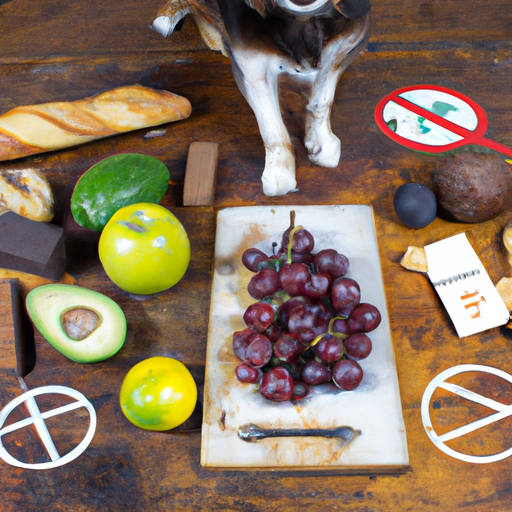As a caregiver for your beloved canine companion, it’s critical that you’re knowledgeable about what foods are safe for them to consume and those which are not. In this comprehensive guide, we’ll explore eight types of foods your furry friend should avoid for their health and well-being.
1. Chocolate and Caffeinated Products
You might adore your morning coffee or that bit of chocolate after dinner, but these foods can be deadly for dogs. They contain substances like methylxanthines, which can cause vomiting, diarrhea, rapid breathing, abnormal heart rhythm, seizures, and even death in dogs.
Table 1.1: Methylxanthine Levels in Different Chocolates
| Chocolate Type | Methylxanthine Level |
|---|---|
| Milk Chocolate | Moderate |
| Dark Chocolate | High |
| White Chocolate | Low |
| Cocoa Powder | Extremely High |
2. Alcohol
Even small amounts of alcohol can cause significant damage to a dog’s liver and brain, much more than it does to humans. Symptoms can range from problems with coordination and difficulty breathing to coma or even death.
3. Grapes and Raisins
Grapes and raisins are highly toxic to dogs, and even small amounts can lead to severe kidney damage or sudden kidney failure.
4. Onions, Garlic, and Chives
These vegetables and herbs can cause gastrointestinal irritation and could lead to red blood cell damage in dogs. While cats are more susceptible, dogs are also at risk if a large enough amount is consumed.
5. Dairy Products
Some dogs have no problem digesting milk and other dairy products. Yet, others could experience digestive problems, including upset stomach and diarrhea, due to the lactose content.
6. Avocado
Avocadoes contain persin, a fungicidal toxin, which can cause serious health problems—even death—in many animals. Dogs are somewhat resistant to persin, but they can become sick from eating too much of it.
7. Nuts, Especially Macadamia Nuts
Macadamia nuts can cause weakness, vomiting, tremors, and hyperthermia in dogs. Symptoms usually last for approximately 48 hours.
8. Raw/Undercooked Meat, Eggs, and Bones
Raw meat and raw eggs can contain bacteria like Salmonella or E. coli, which can be harmful to pets. In addition, raw eggs contain an enzyme called avidin that decreases the absorption of biotin (a B vitamin), leading to skin and coat problems.
Frequently Asked Questions
Q1: Can dogs eat peanut butter?
Yes, dogs can eat peanut butter as long as it doesn’t contain xylitol, a sugar substitute that can be deadly for dogs.
Q2: Are bananas safe for dogs?
Yes, bananas are safe for dogs to eat in moderation. They’re high in potassium, vitamins, biotin, fiber, and copper. They are low in cholesterol and sodium, but they do have a higher sugar content than other fruits.
Q3: What should I do if my dog ingests a harmful food?
If your dog ingests a harmful food, contact your veterinarian or a pet poison control center immediately. The sooner a dog poisoning is diagnosed, the easier, less expensive, and safer it is to treat.
Remember, while it might be tempting to share your food with your furry friend, it’s always best to stick to dog-safe snacks and meals. Being aware of the dangers of these foods can help keep your dog happy, healthy, and by your side for many years to come.



